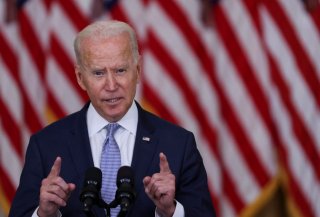Biden Must Be Honest About Afghanistan’s Fate
Either the United States returns to Afghanistan—or Kabul capitulates. There is no other realistic middle-ground for policymakers.
One of the most pernicious myths being propagated by the Defense Department and Biden administration right now is that the Afghan Army can stand and fight on its own. This, however, is unmistakably false.
Since the beginning of the pull-out of U.S. military forces, the Taliban now control 233 of Afghanistan’s districts. The situation has only grown direr in the last week, with nine of Afghanistan’s provincial capitals falling in rapid succession. The U.S. Intelligence Community now projects Kabul could fall within 90 days.
How did it come to this?
The past two months have demonstrated that the majority of the Afghan National Army is grossly unprepared and unable to manage its own affairs when left to stand on its own. A string of defeats marred by poor morale and outright defections to the Taliban have decimated their forces across all corners of Afghanistan. Day after day, social media has been flooded with videos of surrendering Afghan soldiers.
The few Afghan units—in particular, the Afghan Special Forces—that have stood and fought are on the verge of collapse due to chronic logistical supply issues, only further exacerbated by endemic corruption. The 215th Maiwand Corps, for instance, has been surrounded in Lashkar Gah for weeks fighting off the Taliban with only minimal reinforcement from the air—its continued survival only made possible through the sheer willpower of their commanding officer, Sami Sadat.
The Afghan Government’s hope of a popular uprising of militia forces also seems to have been a dismal failure. Militia forces have melted away in the face of determined Taliban assaults across northern Afghanistan. Their failure has enabled Taliban forces to capture the entirety of what used to be the stronghold of the Northern Alliance with the exception of the Panjshir Valley.
There is no Ahmad Shah Massoud coming to save the day for the Afghan government. Old warlords like Abdul Rashid Dostum no longer have the sway they used to if the fall of his hometown is any indication. Even Ismail Khan—who ran to the gates of Herat with Kalashnikov in hand to defend his home—is hopelessly isolated and surrounded by Taliban forces.
The strategic options available to Kabul for turning the tide at this point look equally as bleak.
If Kabul continues its current path in reinforcing enveloped units in Kandahar City or Lashkar Gah, it risks totally depleting its reserves of capable commandos. If the Afghan Special Forces are lost, there will be no units left capable of taking the fight to the Taliban.
Alternatively, an attempt at a retrenchment towards more defensible interior lines around Kabul risks a fiasco reminiscent of Nguyễn Văn Thiệu’s failed retreat in South Vietnam. Afghan units trying to break contact would rapidly become disorganized and risk decimation while trying to break out from their pockets in southern Afghanistan.
Neither does the Afghan government have the option of a rear base from which it can buy time to reorganize its forces. Thanks to the aforementioned collapse of northern Afghanistan, only Kabul and its surrounding environs remain stable from constant Taliban attack.
The Afghan government also cannot rely upon American airpower as a feasible means of turning the tide. Thus far, strikes have been sparse and far from the battlefield. It’s uncertain if they’ll even be allowed to be continued in this limited capacity once the withdrawal is finished.
Still, some in the United States government continue to push on with the prospects of a peace deal as an alternative strategy. In their conceptualization, it's only weeks or months longer and the Taliban will accept some form of power-sharing with the Afghan government merely needing to fight on until then.
This however is nonsense. The Taliban have fought for twenty years with the stated goal of overthrowing the government in Kabul, and given their recent offensive, it’s absurd to think they plan on abandoning it.
Kabul’s government is collapsing by the day, and it has become abundantly clear that only U.S. ground forces can prevent a total defeat. Otherwise, if Washington is going to throw its friends to the wolves, it could at least be honest about the results.
James Beckwith is currently a Philosophy and Classics student at St. John’s College in Annapolis, MD, and a fellow of the Hertog Political Studies and War Studies programs. Prior to college, he served in the United States Army.
Image: Reuters.

